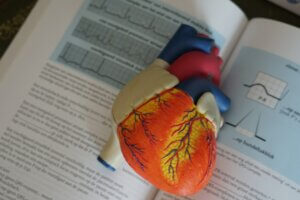 This article focuses on one of the main types of heart disease: hypertension (often called high blood pressure). We will address many of the symptoms and highlight how Norvasc, one of the most preferred forms of treatment today, helps fight heart disease.
This article focuses on one of the main types of heart disease: hypertension (often called high blood pressure). We will address many of the symptoms and highlight how Norvasc, one of the most preferred forms of treatment today, helps fight heart disease.
Putting aside the sudden appearance of the COVID-19 pandemic, heart disease is among the most major public health concerns in the United States to date. According to the Centers for Disease Control and Prevention (CDC), heart disease is the leading cause of death for people across most racial and ethnic groups in the United States. Around one hundred people die every hour in the US from some form of cardiovascular disease. Heart failure, coronary heart disease, heart attacks, and strokes account for one in every five deaths.
According to the CDC, “Most often, heart failure is caused by another medical condition that damages your heart. This includes coronary heart disease, heart inflammation, high blood pressure, cardiomyopathy, or an irregular heartbeat.”
The term ‘heart failure’ can’t be explained in a single sentence. It’s different from most other conditions, which have a reasonably straightforward ’cause – effect – result’ relationship. The progress of heart disease isn’t always so clear-cut.
There can be many causes of heart disease, some or all of which are interrelated. The effects, in many cases, also go on to become aggravating causes in a feedback loop. The result is called ‘heart disease,’ but it’s important to be able to separate the contributory factors so that a proper choice of treatment can be made.
What are the causes, effects, and results of hypertension?
Hypertension (generally regarded as having blood pressure higher than 120/80 Hg) is a condition that can damage blood vessels. The heart has to work harder to pump blood, and the higher pressures increase the risk of a heart attack, stroke, and other serious health issues.
The elevated force of the blood pushing against artery walls will cause thickening and loss of flexibility. In turn, the heart then has to work even harder, creating a loop that will eventually lead to heart failure.
Many lifestyle factors can lead to or worsen hypertension.
- Smoking damages blood vessels and reduces the amount of oxygen in the blood. This causes atherosclerosis, increases the risk of blood clots, and requires the heart to work much harder.
- The high blood sugar levels associated with diabetes can damage blood vessels and nerves, which can also increase the risk of heart disease due to higher blood pressure.
- Cholesterol levels, especially ‘bad’ low-density lipoprotein, or LDL, create fatty plaque deposits that narrow blood vessels and make the heart work harder.
- For obese people, the extra weight puts more strain on the heart. It increases the risk of high blood pressure, creates more ‘bad’ cholesterol, and induces diabetes.
- A sedentary lifestyle increases the risk of heart disease because it can contribute to obesity and higher cholesterol levels.
There is also an inherited factor to consider. A family history of heart disease indicates a higher risk of developing heart disease yourself.
What are the leading pharmaceutical treatments for hypertension?
Antihypertensive medications help lower blood pressure and reduce the strain on the heart. The main types being prescribed today are:
- Calcium channel blockers (CCBs) like Norvasc help fight heart disease by blocking the entry of calcium
- Angiotensin-converting enzyme (ACE) inhibitors and angiotensin II receptor blockers (ARBs) block the enzyme angiotensin II which raises blood pressure
- Beta-blockers block the hormone epinephrine, which in turn causes the heart to beat more slowly and with less force
- Diuretics improve the function of the kidneys.
According to the National Center for Biotechnology Information website, “A large body of evidence demonstrates the safety and efficacy of CCBs for treatment of hypertension and the prevention of morbidity and mortality outcomes, including stroke….CCBs are among the classes of agents recommended … for initial therapy, either alone or in combination with other therapies in the majority of patients who usually require two or more agents to achieve BP goals.”
Why you should buy Norvasc from IsraelPharm
IsraelPharm can supply both branded Norvasc or generic forms of amlodipine at great discount prices compared to US pharmacies:
| Brand | Format | US retail price | IsraelPharm price |
| Norvasc | 10 mg x 30 tablets | $350.00 | $43.00 |
| Norvasc | 5 mg x 30 tablets | $258.00 | $32.00 |
| Generic Amlodipine | 10 mg x 30 tablets | $48.00 | $19.00 |
| Generic Amlodipine | 5 mg x 30 tablets | $45.00 | $14.00 |
FAQ
What are the side effects of calcium channel blockers?
There could be mild side effects that should clear once your body gets used to the meds. Discuss this with your prescribing doctor or pharmacist if they persist or worsen.
The side effects may include:
- Constipation
- Dizziness
- Heart palpitations
- Fatigue
- Flushing
- Headache
- Nausea
- Skin rashes
- Swelling of the feet or lower legs
Doctors will prescribe Norvasc to fight heart disease when the benefits outweigh any risks.
Very rarely, there may be more serious allergic reactions like hives, difficulty in breathing, swelling of the face, lips, tongue, or throat, or side effects like feeling like you might pass out, experiencing chest pain, or pain spreading to the arm or shoulder. Seek emergency treatment.
What medicine is amlodipine? What is Norvasc used for?
Amlodipine is a type of drug known as a calcium channel blocker (CCB), one of a class of medications widely used to treat various cardiovascular conditions, including high blood pressure (hypertension), angina (chest pain), and certain arrhythmias.
Calcium plays a crucial role in the normal functioning of the heart and blood vessels. It is involved in the process of muscle contraction, including the muscles of the heart and the smooth muscles lining the blood vessel walls. Calcium channel blockers work by inhibiting the flow of calcium into these muscle cells.
Norvasc helps fight heart disease by blocking the entry of calcium into the heart muscle cells and blood vessels. CCBs cause the blood vessels to relax and widen, which reduces the pressure inside the vessels and lowers blood pressure.
Can amlodipine cause blurred vision?
There have been some reports that amlodipine can lead to specific eye problems that, if left untreated, can lead to vision loss. Changes in eyesight or eye pain that are noticed at the start of using Norvasc should be reported to your doctor immediately.
Does amlodipine cause shakiness or lightheadedness?
As reported above, one of the mild side effects of Norvasc can be feelings of dizziness, which can also be experienced as lightheadedness or shakiness. If this persists or gets worse, discuss it with your healthcare provider or pharmacists as soon as possible.
Is 5 mg of amlodipine twice a day safe?
Your doctor will prescribe the necessary dose. Generally, not more than 10 mg per day, which can be taken in a single 10 mg tablet, or split into two 5 mg doses.
What should one avoid eating when taking amlodipine?
It’s advised to steer clear of all forms of grapefruit (fruit or juice) when taking Norvasc. This is because grapefruit can increase the concentration of amlodipine in the body and worsen any side effects.
What are the side effects of amlodipine?
Amlopodipine shares the common side effects of CCBs (calcium channel blockers), which are discussed above.
Is amlodipine a blood thinner?
Amlodipine widens blood vessels and increases the volume of blood and oxygen getting through to the heart. It also lowers blood pressure. It does not thin the blood.
Can amlodipine cause swollen ankles?
One of the side effects reported for CCBs is swelling of the feet and lower legs. If this persists or gets worse, discuss this with your healthcare provider or pharmacist.
Can Norvasc cause hair loss?
There are no known reports that Norvasc has any side effects relating to hair growth or producing hair loss.
Can amlodipine cause gout?
There are no known reports that amlodipine has any side effects that produce joint stiffness or gout.
Is amlodipine an antidepressant?
Research has found that nearly one in three people with hypertension or related cardiovascular problems also has depression. There are suggestions that several common antihypertensive medications, including Norvasc, may help reduce the risk of depression. So, while amlodipine does not act directly as an antidepressant, it may benefit patients who suffer from hypertension and depression.
Is it safe to take ibuprofen with blood pressure medication?
It is essential to discuss co-medication with your doctor or pharmacist. In some cases, the combination of ibuprofen with many blood pressure medicines may cause damage to the kidneys in susceptible people, mainly if they have also been prescribed a diuretic.
What are the primary forms of heart disease?
The primary causes can be broken down into a few main categories. Still, they are not separate, with crossovers between them all leading ultimately to heart disease.
Hypertension, or high blood pressure, causes damage to blood vessels throughout the body. Damage to the arteries makes them less elastic, which in turn decreases the flow of blood and oxygen to the heart resulting in heart disease. Norvasc helps fight heart disease by lowering blood pressure.
Atherosclerosis develops when fatty deposits (plaque) build up on the inner walls of arteries, causing them to narrow and harden. This results in restricted blood flow throughout the body. Most significantly, it can block blood flow to the brain, causing strokes or the heart muscles, leading to a heart attack. Plaque forms when there is too much “bad” cholesterol in the blood.
Cardiac dysrhythmia occurs when the rate or rhythm of the heartbeat varies, either too quickly (tachycardia), too slowly (bradycardia), or with an irregular pattern. It is caused by changes in the heart’s sequence of electrical impulses.
Atrial fibrillation is the heart beating irregularly and often abnormally fast, with the nerve pulses to the atrial (upper) chambers not synchronizing as they should.
Heart valve diseases can occur if one or more of the four valves that open and shut with each heartbeat to keep blood flowing in the right direction don’t function properly. Valves can be leaking (regurgitation), without a proper opening (atresia), or too narrow (stenosis). People can be born with heart valve defects, which may occur due to infection or develop over the years.
Cardiomyopathy occurs when there are problems with the heart’s muscles. They may become stiffer, thicker, or larger than normal, weakening the heart and making it have to work harder to pump blood. There are many causes and types of cardiomyopathy, and it affects people of all ages.

















